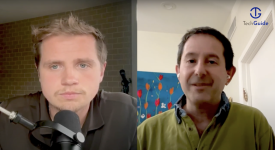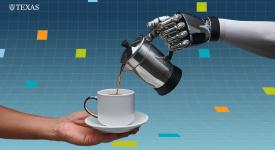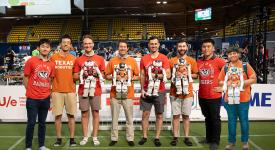Peter Stone
Peter Stone to Lead UT Department of Computer Science as Chair, Emphasizing Continued Growth and Community

08/15/2025 - Prof. Peter Stone is a luminary in the Department of Computer Science, where he has been a faculty member for 23 years. Over the course of his tenure, he has been a firsthand witness to the rapid evolution of computer science research and education. This experience informs his vision for the department as one of continued growth, a strong community of partnership, and a commitment to ensuring our next generation is prepared to lead in a future shaped by emerging technologies.
ACM Recognizes Peter Stone’s Impact on AI, Intelligent Robotics, and Autonomous Agents

05/01/2025 - Peter Stone, Professor of Computer Science at UT Austin and Chief Scientist at Sony AI, has received the ACM - AAAI Allen Newell Award for his pioneering work in artificial intelligence. His research has transformed how autonomous agents learn from experience, collaborate in teams, and adapt across tasks—contributions that have shaped the fields of reinforcement learning, multiagent systems, and intelligent robotics.
How Undergraduates Can Get Research Experience with Peter Stone

02/12/2025 - In a recent interview with TechGuide.org, UT Austin Computer Science Professor Peter Stone shares insights on how undergraduates can secure research opportunities in AI. As the founder of the Learning Agents Research Group and Director of Texas Robotics, he emphasizes the value of interdisciplinary skills, hands-on research, and continuous learning. Listen to the full conversation to explore AI career paths, research strategies, and actionable steps for breaking into the field.
On AI for the Rest of Us: What is AI, Anyways?

12/03/2024 - Co-hosts Marc Airhart and Casey Boyle talk with CS Professor Peter Stone to distinguish what is and is not artificial intelligence. Stone, also director of Texas Robotics, executive director of Sony AI America, works on the 100 Year Study on AI and is part of UT’s Good Systems initiative. Airhart, Boyle, and Stone talk about ethical AI use and what is the best way of thinking about it in this artificial intelligence primer.
Texas RoboCup Team on KXAN
08/12/2024 - Are AI robots the future of sports? These UT students think soAustin (KXAN) — A team of UT students, led by Professor Peter Stone, recently triumphed at the RoboCup Home competition in the Netherlands, where their AI-powered robots autonomously played soccer. The students believe their research is paving the way for a future where robots can compete against humans in sports, revolutionizing the field of AI robotics.
In Robot Soccer and More, UT Students Best the Competition in Eindhoven

07/24/2024 - Among hundreds of teams from around the world competing at RoboCup 2024, UT researchers and their robots shine.
Transforming Human-Robot Interaction Through Mood Inducing Music

05/06/2024 - Music has always had the power to stir our emotions, from the exhilaration of a fast-paced rock anthem to the melancholy of a soulful ballad. But, could the music we listen to also affect how we make decisions, especially in our interactions with robots? This intriguing question lies at the heart of a study conducted by UT Austin Assistant Professor Elad Liebman and Professor Peter Stone.
Could a Robot Win the World Cup? UT Experts Explore Future of Automatons

04/19/2024 - UT Computer Science is at the forefront of robotics innovation, aiming to propel the field forward. Highlighted in a recent article by KXAN, experts like Dr. Peter Stone and Justin Hart showcased their work, including advancements in generative AI, which is integral to tasks ranging from domestic chores to humanoid robot soccer, a part of the RoboCup Federation's ambitious goal of a robot team winning the World Cup by 2050.
Unlocking the Power of Bilevel Optimization: BOME

11/08/2023 - In mathematical optimization, a new approach is emerging, promising to transform how we tackle intricate challenges across various domains. Consider the complexity of bilevel optimization, a problem that has confounded experts in machine learning, engineering, and other fields. Recent advances are providing new insights into this intricate landscape, presenting a streamlined technique that has the potential to significantly enhance our ability to navigate these complex problems.




